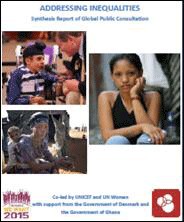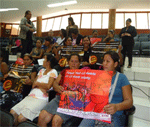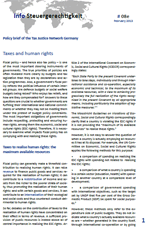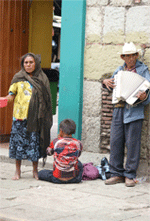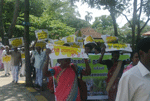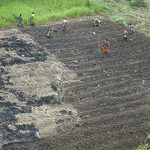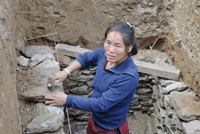Social Watch news
Published on Mon, 2013-03-04 23:00
Since the end of the Korean War in 1950, the country has achieved sustained economic growth. GDP, which at that time was US$ 67, doubled in a decade, between 2000 and 2010, Korea joined the OECD in 1996 and achieved most of the Millennium Development Goals (MDGs). But inequality, as a side effect of economic growth, is present. There is no more extreme poverty but diversified poverty, and society still has challenges that are not shown by the indicators. The government's economic policy has encouraged assembling industry export-oriented with cheap labor. Between 2000 and 2009, relative poverty rates for children, seniors and women increased. Poverty is concentrated in the elderly at female level, low education, vulnerable health and in rural areas. It is clear that the government needs to implement policies to reduce socioeconomic inequality that go beyond reducing inequity and poverty, by creating quality jobs and social protection programs. |
Published on Thu, 2013-02-28 17:53
For over a decade the debate, research and practice focused on extreme poverty. However, the key to the new development agenda could be somewhere else, much less illuminated by the political debate: inequality. This is what emerges from several months of consultations with academics and civil society organizations performed by the specialized agencies of the United Nations on women and children, UN Women and UNICEF. |
Published on Thu, 2013-02-28 17:22
The Center for Women's Studies-Honduras (CEM-H), the Center for Women's Rights, the Women's Network of Colonia Ramón Amaya Amador, the Women's Network of Manzanal, the Women's Network of the Red Cross Col were present on February 22 before Congress in order to lobby and monitor that the proposal for a typification of femicide coordinated with the Ministry of Human Rights and Justice is in line with the work performed for more than ten years by feminist organizations for the construction of an offense that punishes men who kill women because they are women. The typification of femicide means to improve the registration systems of the judiciary, as well as to review and elaborate necessary, relevant and timely legislation for the recognition and punishment of other forms of violence against women. |
| Published on Fri, 2013-02-22 06:11 |
Published on Thu, 2013-02-21 20:00
The 2010 Progress Government Report on the MDGs in Mexico emphasizes that most of the indicators associated with the MDGs and their goals have significantly improved, claiming to have met most of them and anticipating the rest would be met by 2015. Despite the progress, the report indicates that there is still a long way to go: income inequality and living conditions of poverty and vulnerability in many families still persist; it is necessary to reduce maternal mortality and consolidate gender equality; the vital challenge of environment and higher economic growth is still unsolved. |
Published on Thu, 2013-02-21 18:42
Experiences of farmer organizations and people’s organizations over the last 15 years show that ecological agriculture is a very effective way of overcoming hunger and poverty and of reducing ill health, and ecological destruction caused by conventional chemical farming. Over a hundred organizations of farmers, fishers, women, plantation workers and industrial workers have struggled in Sri Lanka for a more logical, workable and people friendly approach and strategy for economic improvement, reduction of poverty and hunger and for social justice. Today they are able to present a very workable alternative approach to the economy and development process in the country. |
Published on Thu, 2013-02-21 17:41
Tanzania is endowed with abundant natural resources but lacks mechanisms for utilizing them effectively for micro and macro development. Invitation to foreign and local companies to invest in key economic sectors is yet to yield expected results. For instance, incentives and tax evasions are so high. The government is therefore urged to diversify the economy and find more viable and alternative sources of revenues for economic development. |
Published on Thu, 2013-02-14 22:37
Evidence in Nepal suggests that the root causes of the political conflict include not only the severity of poverty and inequality but also the sense of entrenchment - that opportunities are limited or non-existent for the poor to climb out of poverty. Therefore, addressing constraints on the inclusiveness of development is critical in order to make a real difference in the lives of Nepalis and reduce the risks of instability. |
Published on Thu, 2013-02-14 21:22
The Finnish government wants to be an accountable member of the international community, but its political will to be so does not always transpire. Finland has not, for example, been able to reach the 0.7 % target for its development funding. |
SUSCRIBE TO OUR NEWSLETTER


